Purchasing a pasta machine is the first step to experiencing a world of fresh homemade pasta, the next time step which is just as important entails learning the recipes to make fresh homemade pasta, this may seem daunting for some people, however, Culinary has taken the effort to help you transform you into a pasta-making guru.
We've compiled a basic list of easy-to-learn recipes of different types of pasta you can make with your Marcato Atlas 150 pasta machine.
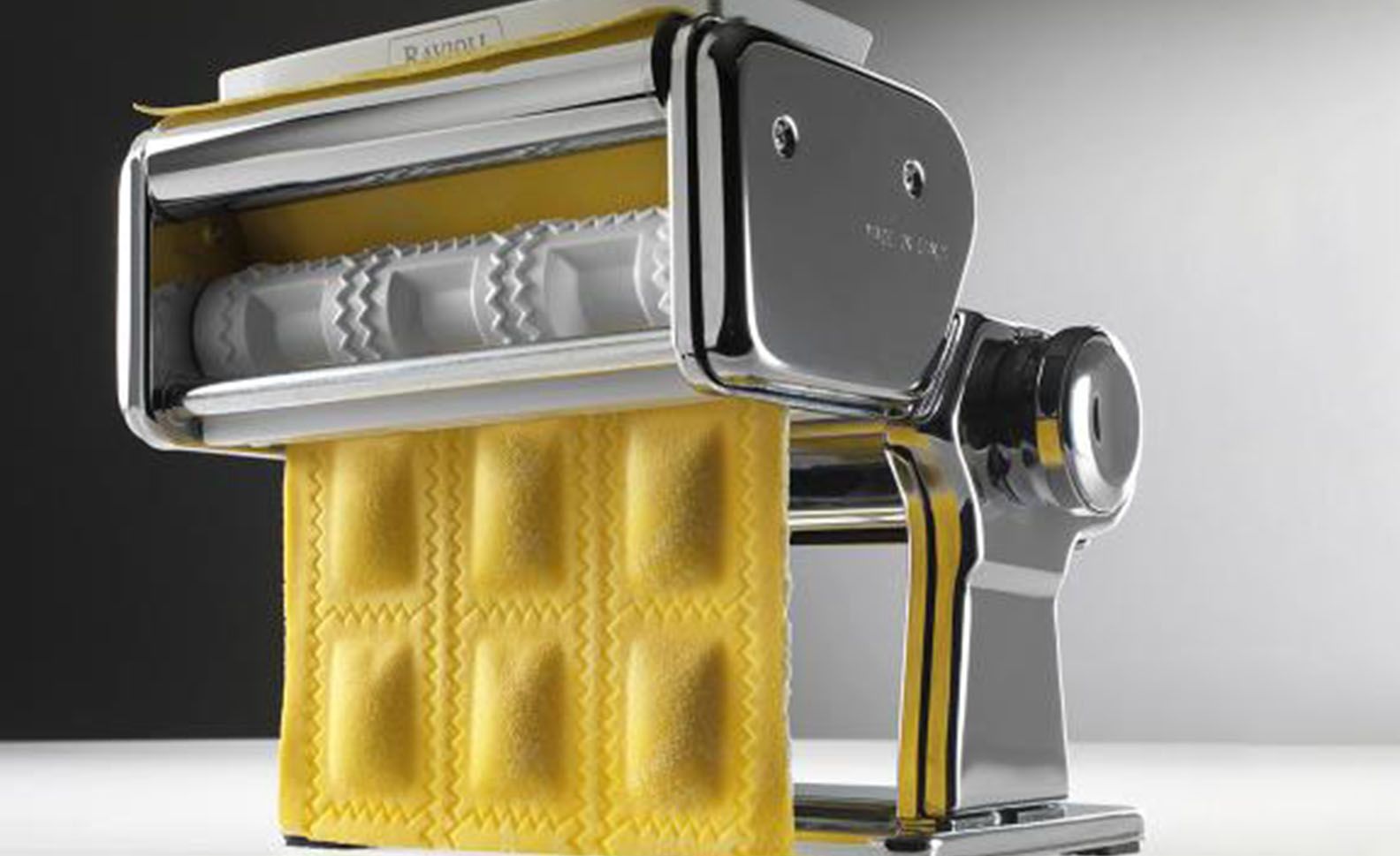
1. Ravioli Pasta
What you need250g of soft wheat flour type "00"
250g of durum wheat flour (semolina)
5 whole eggs and water up to a total of 250
Step 1
Pour the flour into a bowl; add the eggs and water in the middle.
Stir to combine all the ingredients.
Work the mixture with your hands until it is completely homogeneous and consistent. If the dough is too dry, add water, if it is too soft, add flour. A great dough should never stick to your fingers.
Step 2
Set the machine's regulator to number 0. Pass a piece of dough through the rollers, turning the crank clockwise.
Lightly flour the two sides of the pastry thus obtained and fold it in half. Pass the dough through the smooth rollers 5-6 times until the dough has taken a long and regular shape.
- Place the regulator on number 1 and pass the sheet only once; then place the regulator on number 2 and so on until thickness 6.
Cutting the Ravioli
Insert the crank into the accessory. Fold the floured dough in two and insert one end between the rollers of the accessory, turning the crank for about a quarter of a turn.
Separate the two parts of the pastry by placing them on the metal rollers. Hook the hopper onto the accessory above the dough sheet.
- Pour the filling between the two sheets and slowly turn the crank. Add more filling when needed.
- Place the strip of dough on a lightly floured tablecloth and let it dry for a few minutes. Separate the ravioli one by one.
- Stuffed pasta can be cooked on the spot or stored in the refrigerator for 2-3 days. For longer storage, you can freeze the pasta.
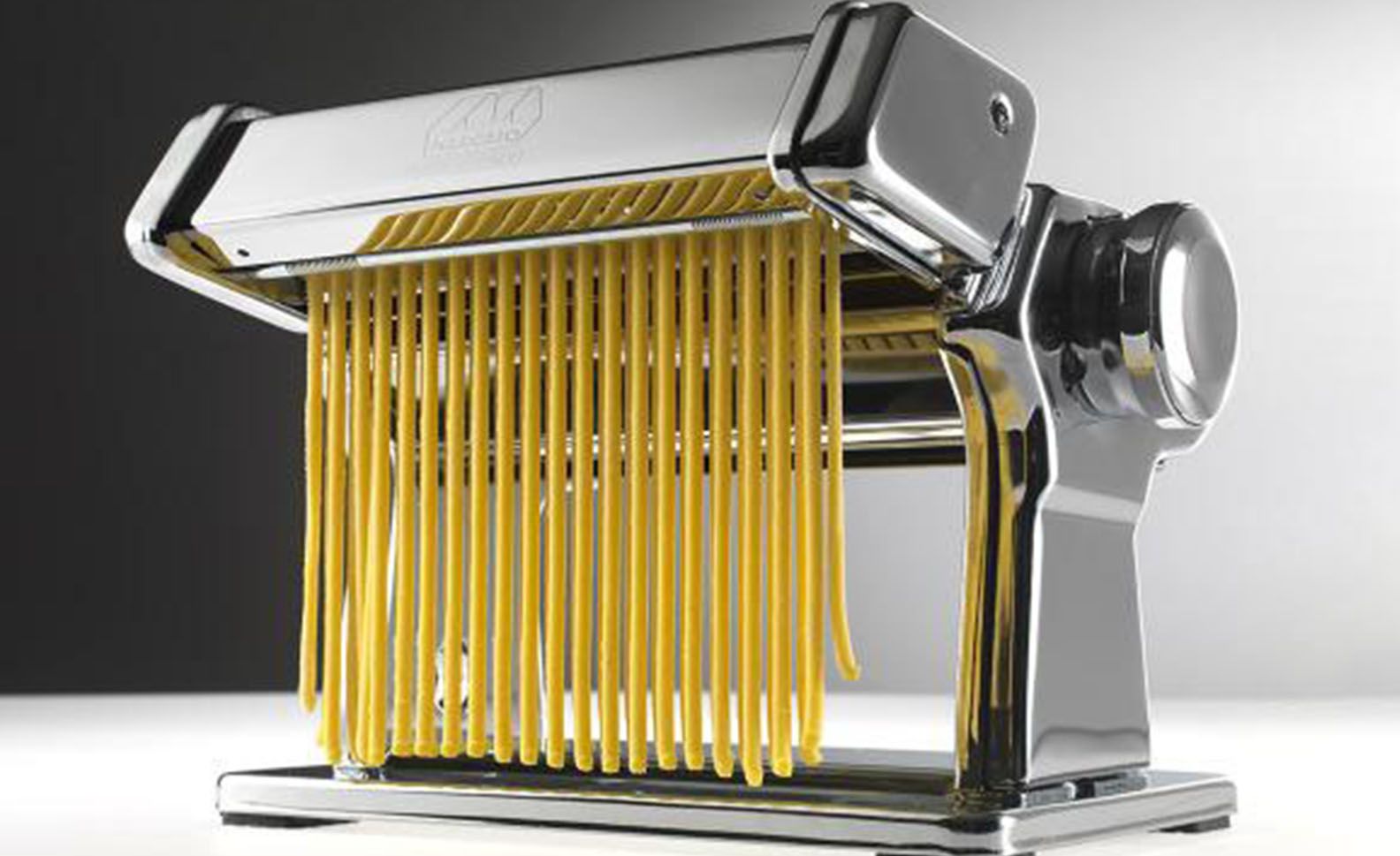
2. Bigoli
What you need for pasta dough
250g of soft wheat flour type "00"
250g of durum wheat flour (semolina)
5 whole eggs and water up to a total of 250
Step 1
Pour the flour into a bowl; add the eggs and water in the middle.
Stir to combine all the ingredients.
Work the mixture with your hands until it is completely homogeneous and consistent. If the dough is too dry, add water, if it is too soft, add flour. A great dough should never stick to your fingers.
Step 2: Pasta Sheets
Set the machine's regulator to number 0. Pass a piece of dough through the rollers, turning the crank clockwise.
Lightly flour the two sides of the pastry thus obtained and fold it in half. Pass the dough through the smooth rollers 5-6 times until the dough has taken a long and regular shape.
- Set the adjustment knob to 1 and pass the sheet through just once; then set the adjustment knob to 2 and pass it one last time.
- Cut the pasta sheet crosswise, into pieces about 25cm long, and lightly dust them with flour.
Step 3: Cutting Bigoli
Insert the crank into the accessory. Pass the pasta sheet through the rollers and collect the freshly cut bigoli with the Tacapasta stick. Lay them to dry on Tacapasta.
The pasta dries in about 5-6 hours and can then be stored in suitable kitchen containers.
- Bigoli can be eaten fresh, dried, or frozen. In order to maintain the flavour of the pasta be advised to consume it within hours of preparation.
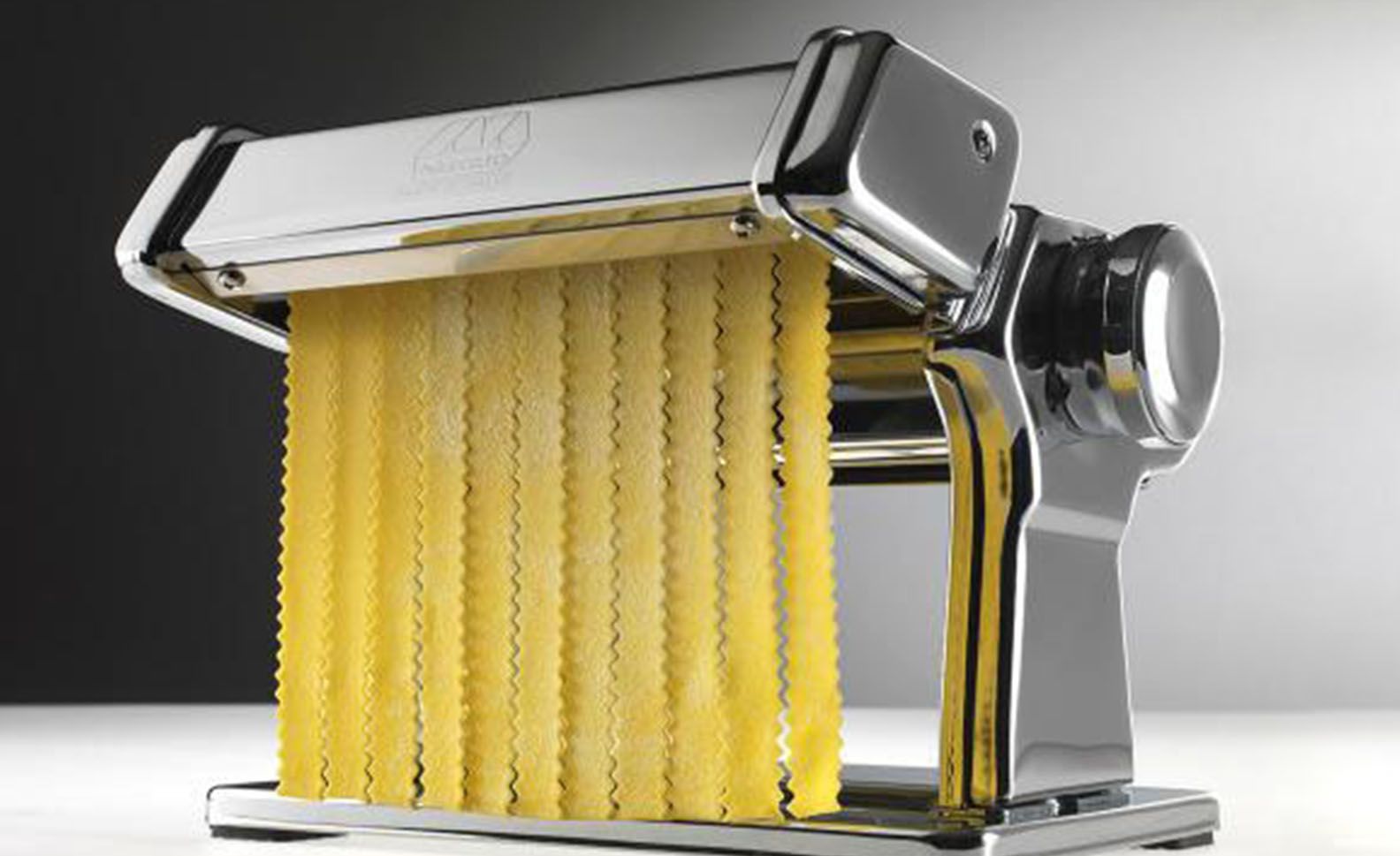
3. Reginette
What you need for pasta dough
250g of soft wheat flour type "00"
250g of durum wheat flour (semolina)
5 whole eggs and water up to a total of 250
Step 1
Pour the flour into a bowl; add the eggs and water in the middle.
Stir to combine all the ingredients.
Work the mixture with your hands until it is completely homogeneous and consistent. If the dough is too dry, add water, if it is too soft, add flour. A great dough should never stick to your fingers.
Step 2: Pasta Sheets
Set the machine's regulator to number 0. Pass a piece of dough through the rollers, turning the crank clockwise.
Lightly dust both sides of the pasta sheet with flour and fold it in half. Feed the pasta sheet through the smooth rollers again 5-6 times until the pasta sheet is long and regular in shape.
- Set the adjustment knob to 1 and pass the pasta sheet through just once; then, set the adjustment knob to 2 and so on until thickness 6
- Cut the pasta sheet crosswise, into pieces about 25cm long, and lightly dust them with flour.
Step 3: Cutting Reginette
Insert the crank into the accessory. Pass the pasta sheet through the rollers and collect the freshly cut Reginette with the Tacapasta stick. Lay them to dry on Tacapasta.
The pasta dries in about 5-6 hours and can then be stored in suitable kitchen containers.
- Reginette can be eaten fresh, dried, or frozen. We recommend eating dried for a perfect result.
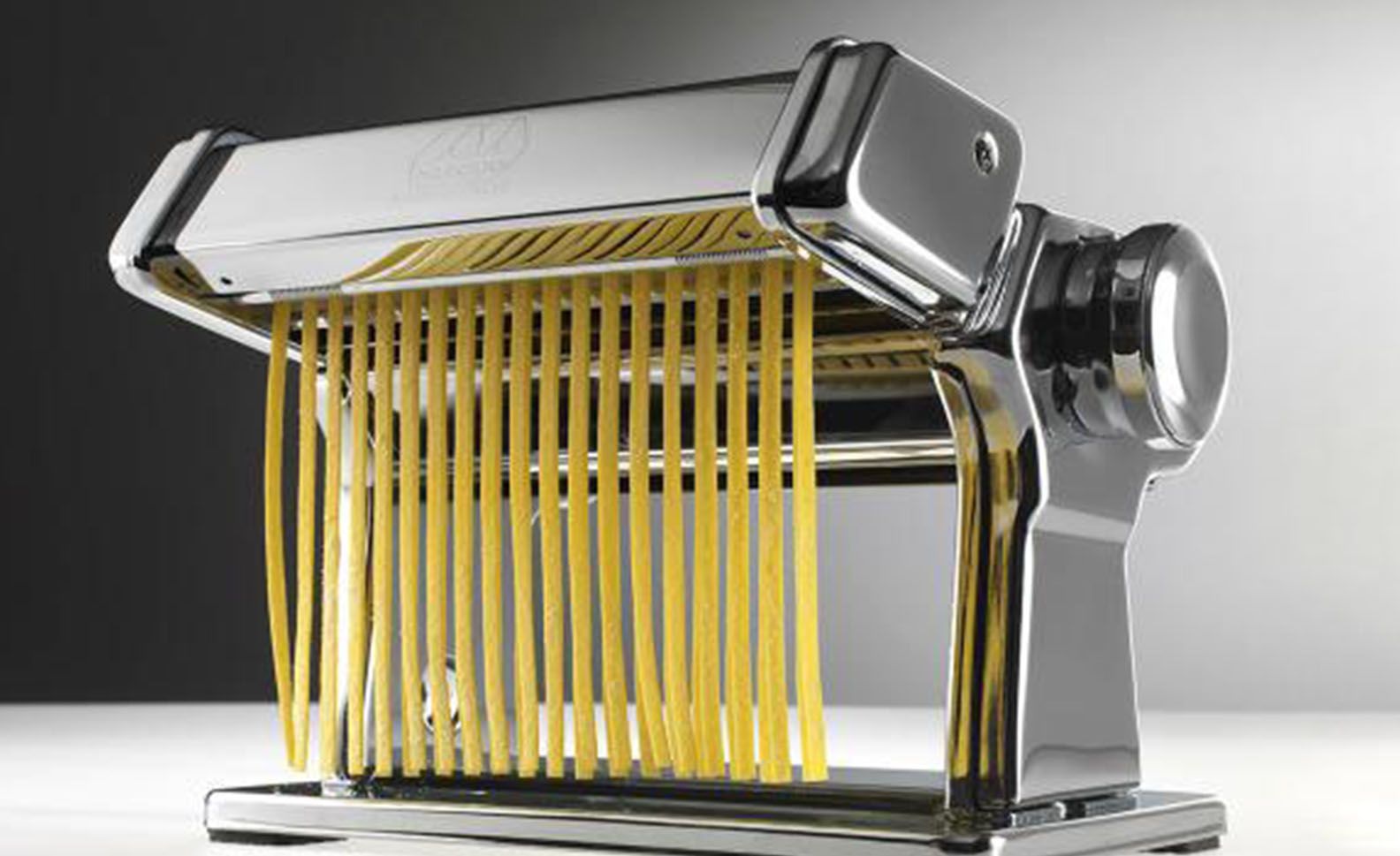
4. Trenette
What you need for pasta dough
250g of soft wheat flour type "00"
250g of durum wheat flour (semolina)
5 whole eggs and water up to a total of 250
Step 1
Pour the flour into a bowl; add the eggs and water in the middle.
Stir to combine all the ingredients.
Work the mixture with your hands until it is completely homogeneous and consistent. If the dough is too dry, add water, if it is too soft, add flour. A great dough should never stick to your fingers.
Step 2: Pasta Sheets
Set the adjustment knob of the machine to 0. Feed a ball of dough through the rollers and turn the crank clockwise.
Lightly dust both sides of the pasta sheet with flour and fold it in half. Feed the pasta sheet through the smooth rollers again 5-6 times until the pasta sheet is long and regular in shape.
- Set the adjustment knob to 1 and pass the pasta sheet through just once; then, set the adjustment knob to 2 and so on until thickness 6
- Cut the pasta sheet crosswise, into pieces about 25cm long, and lightly dust them with flour.
Step 3: Cutting Reginette
Insert the crank into the accessory. Pass the pasta sheet through the rollers and collect the freshly cut Trenette with the Tacapasta stick. Lay them to dry on Tacapasta.
The pasta dries in about 5-6 hours and can then be stored in suitable kitchen containers.
- Trenette can be eaten fresh, dried, or frozen. We recommend eating dried to enhance the aroma of the pesto.
What you need for pasta dough
250g of soft wheat flour type "00"
250g of durum wheat flour (semolina)
5 whole eggs and water up to a total of 250
Step 1
Pour the flour into a bowl; add the eggs and water in the middle.
Stir to combine all the ingredients.
Work the mixture with your hands until it is completely homogeneous and consistent. If the dough is too dry, add water, if it is too soft, add flour. A great dough should never stick to your fingers.
Step 2: Pasta Sheets
Set the adjustment knob of the machine to 0. Feed a ball of dough through the rollers and turn the crank clockwise.
Lightly dust both sides of the pasta sheet with flour and fold it in half. Feed the pasta sheet through the smooth rollers again 5-6 times until the pasta sheet is long and regular in shape.
- Set the adjustment knob to 1 and pass the pasta sheet through just once; then, set the adjustment knob to 2 and so on until thickness 6
- Cut the pasta sheet crosswise, into pieces about 25cm long, and lightly dust them with flour.
Step 3: Cutting Reginette
Insert the crank into the accessory. Pass the pasta sheet through the rollers and collect the freshly cut Trenette with the Tacapasta stick. Lay them to dry on Tacapasta.
The pasta dries in about 5-6 hours and can then be stored in suitable kitchen containers.
- Trenette can be eaten fresh, dried, or frozen. We recommend eating dried to enhance the aroma of the pesto.
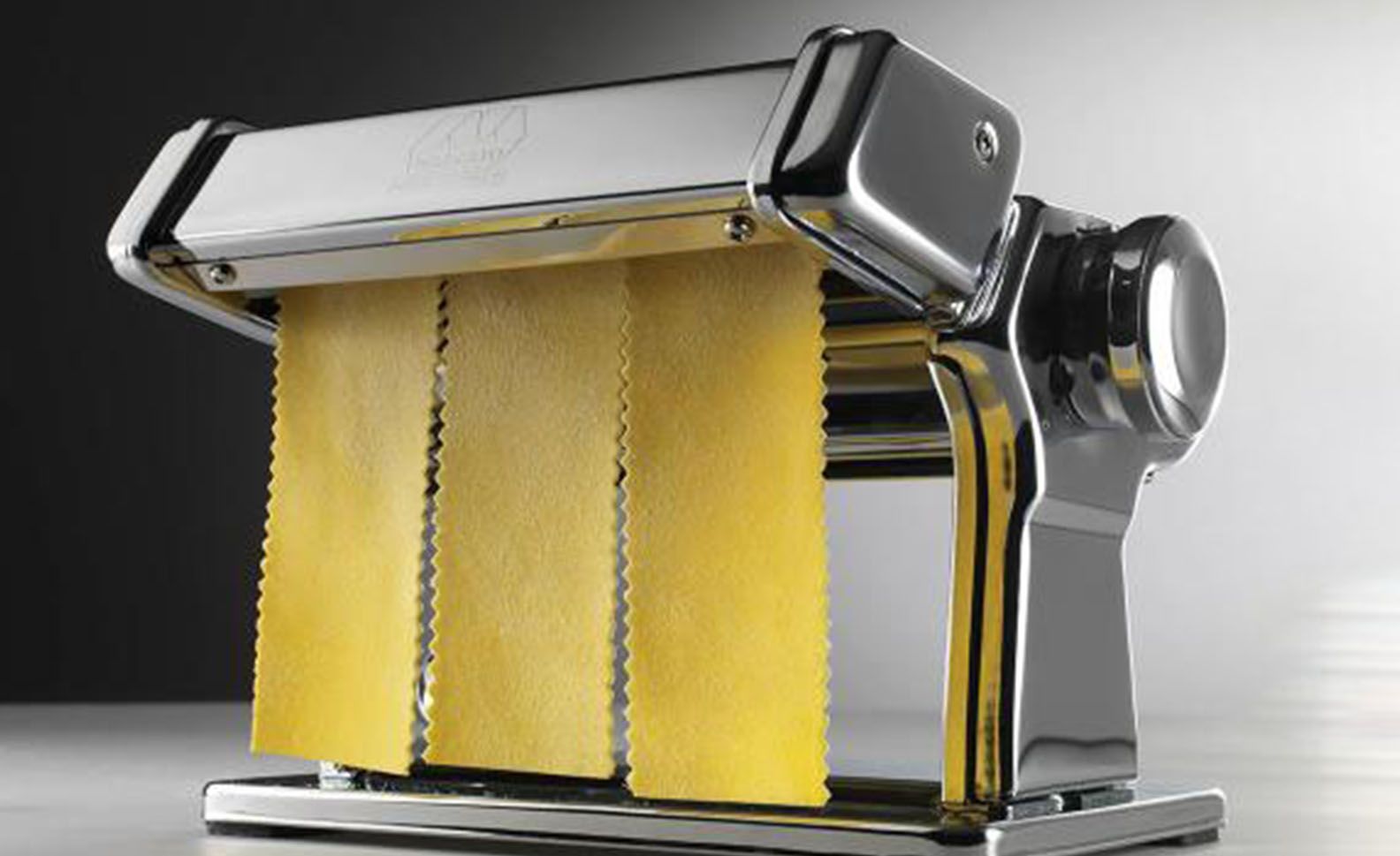
5. Pappardelle
What you need for pasta dough
250g of soft wheat flour type "00"
250g of durum wheat flour (semolina)
5 whole eggs and water up to a total of 250
Step 1
Pour the flour into a bowl; add the eggs and water in the middle.
Stir to combine all the ingredients.
Work the mixture with your hands until it is completely homogeneous and consistent. If the dough is too dry, add water, if it is too soft, add flour. A great dough should never stick to your fingers.
Step 2: Pasta Sheets
Set the adjustment knob of the machine to 0. Feed a ball of dough through the rollers and turn the crank clockwise.
Lightly dust both sides of the pasta sheet with flour and fold it in half. Feed the pasta sheet through the smooth rollers again 5-6 times until the pasta sheet is long and regular in shape.
- Set the adjustment knob to 1 and pass the pasta sheet through just once; then, set the adjustment knob to 2 and so on until thickness 6.
- Cut the pasta sheet crosswise, into pieces about 25cm long, and lightly dust them with flour.
Step 3: Cutting Reginette
Insert the crank into the accessory. Pass the pasta sheet through the rollers and collect the freshly cut Pappardelle with the Tacapasta stick. Lay them to dry on Tacapasta.
The pasta dries in about 5-6 hours and can then be stored in suitable kitchen containers.
- Pappardelle can be eaten fresh, dried, or frozen. The sauce is absorbed better by dry pappardelle.
What you need for pasta dough
250g of soft wheat flour type "00"
250g of durum wheat flour (semolina)
5 whole eggs and water up to a total of 250
Step 1
Pour the flour into a bowl; add the eggs and water in the middle.
Stir to combine all the ingredients.
Work the mixture with your hands until it is completely homogeneous and consistent. If the dough is too dry, add water, if it is too soft, add flour. A great dough should never stick to your fingers.
Step 2: Pasta Sheets
Set the adjustment knob of the machine to 0. Feed a ball of dough through the rollers and turn the crank clockwise.
Lightly dust both sides of the pasta sheet with flour and fold it in half. Feed the pasta sheet through the smooth rollers again 5-6 times until the pasta sheet is long and regular in shape.
- Set the adjustment knob to 1 and pass the pasta sheet through just once; then, set the adjustment knob to 2 and so on until thickness 6.
- Cut the pasta sheet crosswise, into pieces about 25cm long, and lightly dust them with flour.
Step 3: Cutting Reginette
Insert the crank into the accessory. Pass the pasta sheet through the rollers and collect the freshly cut Pappardelle with the Tacapasta stick. Lay them to dry on Tacapasta.
The pasta dries in about 5-6 hours and can then be stored in suitable kitchen containers.
- Pappardelle can be eaten fresh, dried, or frozen. The sauce is absorbed better by dry pappardelle.
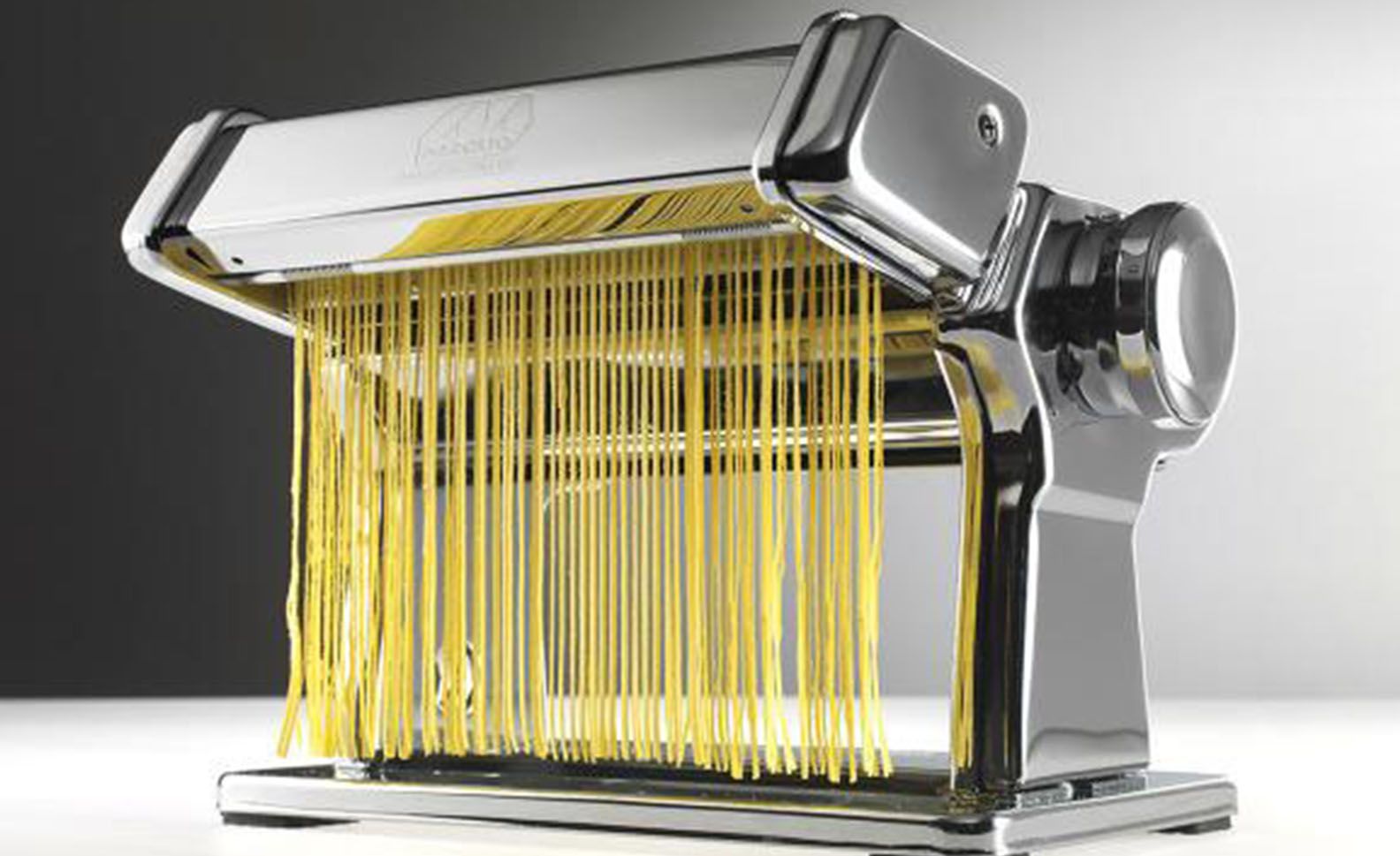
6. Capellini
What you need for pasta dough
250g of soft wheat flour type "00"
250g of durum wheat flour (semolina)
5 whole eggs and water up to a total of 250
Step 1
Pour the flour into a bowl; add the eggs and water in the middle.
Stir to combine all the ingredients.
Work the mixture with your hands until it is completely homogeneous and consistent. If the dough is too dry, add water, if it is too soft, add flour. A great dough should never stick to your fingers.
Step 2: Pasta Sheets
Set the adjustment knob of the machine to 0. Feed a ball of dough through the rollers and turn the crank clockwise.
Lightly dust both sides of the pasta sheet with flour and fold it in half. Feed the pasta sheet through the smooth rollers again 5-6 times until the pasta sheet is long and regular in shape.
- Set the adjustment knob to 1 and pass the pasta sheet through just once; then, set the adjustment knob to 2 and so on until thickness, 8 to 9 is reached.
- Cut the pasta sheet crosswise, into pieces about 25cm long, and lightly dust them with flour.
Step 3: Cutting Cappellini
Insert the crank into the accessory. Pass the pasta sheet through the rollers and collect the freshly cut Capellini with the Tacapasta stick. Lay them to dry on Tacapasta.
The pasta dries in about 1 hour and can then be stored in suitable kitchen containers.
- Cappellini can be eaten fresh, dried, or frozen. For them to absorb the sauce well, we recommend eating them once dried.
What you need for pasta dough
250g of soft wheat flour type "00"
250g of durum wheat flour (semolina)
5 whole eggs and water up to a total of 250
Step 1
Pour the flour into a bowl; add the eggs and water in the middle.
Stir to combine all the ingredients.
Work the mixture with your hands until it is completely homogeneous and consistent. If the dough is too dry, add water, if it is too soft, add flour. A great dough should never stick to your fingers.
Step 2: Pasta Sheets
Set the adjustment knob of the machine to 0. Feed a ball of dough through the rollers and turn the crank clockwise.
Lightly dust both sides of the pasta sheet with flour and fold it in half. Feed the pasta sheet through the smooth rollers again 5-6 times until the pasta sheet is long and regular in shape.
- Set the adjustment knob to 1 and pass the pasta sheet through just once; then, set the adjustment knob to 2 and so on until thickness, 8 to 9 is reached.
- Cut the pasta sheet crosswise, into pieces about 25cm long, and lightly dust them with flour.
Step 3: Cutting Cappellini
Insert the crank into the accessory. Pass the pasta sheet through the rollers and collect the freshly cut Capellini with the Tacapasta stick. Lay them to dry on Tacapasta.
The pasta dries in about 1 hour and can then be stored in suitable kitchen containers.
- Cappellini can be eaten fresh, dried, or frozen. For them to absorb the sauce well, we recommend eating them once dried.

7. Spaghetti
What you need for pasta dough
250g of soft wheat flour type "00"
250g of durum wheat flour (semolina)
5 whole eggs and water up to a total of 250
Step 1
Pour the flour into a bowl; add the eggs and water in the middle.
Stir to combine all the ingredients.
Work the mixture with your hands until it is completely homogeneous and consistent. If the dough is too dry, add water, if it is too soft, add flour. A great dough should never stick to your fingers.
Step 2: Pasta Sheets
Set the adjustment knob of the machine to 0. Feed a ball of dough through the rollers and turn the crank clockwise.
Lightly dust both sides of the pasta sheet with flour and fold it in half. Feed the pasta sheet through the smooth rollers again 5-6 times until the pasta sheet is long and regular in shape.
- Set the adjustment knob to 1 and pass the pasta sheet through just once; then, set the adjustment knob to 2 and so on until thickness 4.
- Cut the pasta sheet crosswise, into pieces about 25cm long, and lightly dust them with flour.
Step 3: Cutting Spaghetti
Insert the crank into the accessory. Pass the pasta sheet through the rollers and collect the freshly cut Spaghetti with the Tacapasta stick. Lay them to dry on Tacapasta.
The pasta dries in about 5-6 hours and can then be stored in suitable kitchen containers.
- Spaghetti can be eaten fresh, dried, or frozen. We recommend eating them dried for a perfect result.
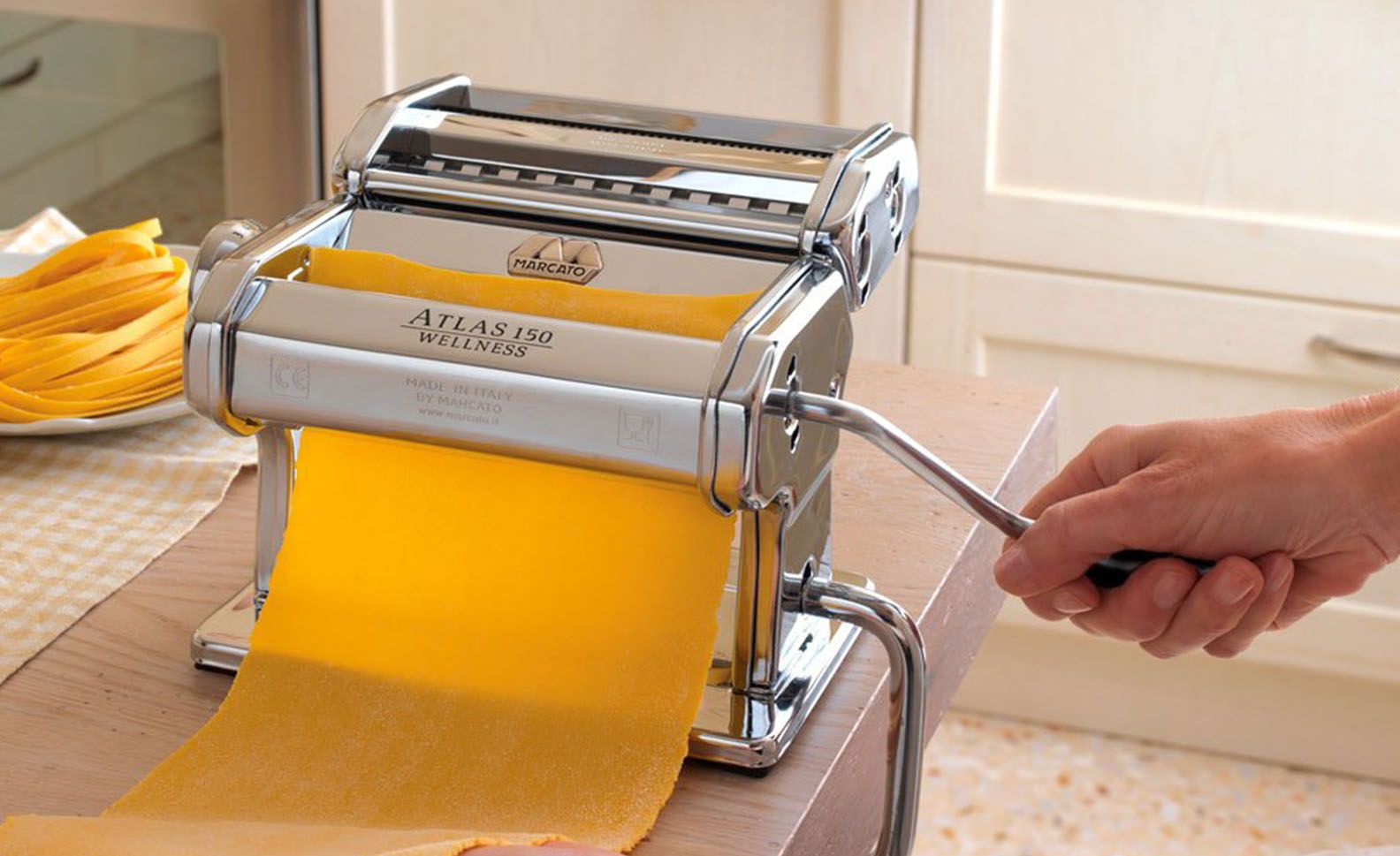
8. Lasagna
What you need for pasta dough
250g of soft wheat flour type "00"
250g of durum wheat flour (semolina)
5 whole eggs and water up to a total of 250
Step 1
Pour the flour into a bowl; add the eggs and water in the middle.
Stir to combine all the ingredients.
Work the mixture with your hands until it is completely homogeneous and consistent. If the dough is too dry, add water, if it is too soft, add flour. A great dough should never stick to your fingers.
Step 2: Preparing Lasagna
Set the adjustment knob of the machine to 0. Feed a ball of dough through the rollers and turn the crank clockwise.
Lightly dust both sides of the pasta sheet with flour and fold it in half. Feed the pasta sheet through the smooth rollers again 5-6 times until the pasta sheet is long and regular in shape.
- Set the adjustment knob to 1 and pass the pasta sheet through just once; then, set the adjustment knob to 2 and so on until you reach the desired thickness.
- Cut the pasta sheet crosswise, into pieces, according to the type of pasta you want to make.


Easy-To-Make Homemade Pasta Recipes